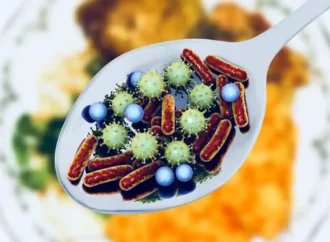If you love Chinese food, you might be familiar with a tiny salt-like compound known as Monosodium glutamate (MSG). It is a wonderful taste enhancer and provides umami flavour. Monosodium Glutamate : A Danger or Not?
Monosodium Glutamate : A Danger or Not?
Ajinomoto : Essence of Taste
Ajinomoto is the name of the company that manufactures monosodium glutamate. The product became popular by the name Ajinomoto and the company trademarked it later.
Ajinomoto in Japanese translates to Essense of taste.
Sources of MSG
MSG is derived from L-glutamic acid. Monosodium Glutamate is found naturally in foods such as cheese, tomatoes, broccoli, and meat. Your body can’t identify the difference between the glutamic acid found naturally and that found in MSG as there is no chemical difference between the two types.
Most MSG known as E621 in the food industry, is produced by fermentation with the Corynebacterium species, cultured with ammonia and carbohydrates from sugar beets, tapioca, sugarcane, molasses, which excrete amino acids into a culture broth. It is then neutralised with sodium.
History of MSG controversy
MSG’s bad reputation rose in 1968, when Dr. Robert Ho Man Kwok wrote a letter to the New England Journal of Medicine explaining that he got sick after consuming Chinese food. He coined the term “Chinese restaurant syndrome” and believed his symptoms resulted from consuming either alcohol, sodium, or MSG.
Biases against Chinese immigrants, their culture and cuisine played a huge role in propagating the misinformation about MSG in the United States of America. Later on, a number of studies stated that the additive was highly toxic . Flaws in the accuracy of these researches include inadequate control groups, small sample sizes, a lack of dosage accuracy, methodological flaws, the administration of MSG via injectors with little to no relevance to oral intake.
Current Scenario of MSG
Recent studies have failed to find a conclusive link between MSG and the symptoms some people describe. Today, the Food and Drug Administration (FDA), Joint FAO/WHO Expert Committee on Food Additives (JECFA), and the European Food Safety Association (EFSA) consider MSG to be generally recognised as safe (GRAS). They have also determined an acceptable daily intake 30 mg per kilogram of body weight per day. 
The Government of India’s (GOI) Food Safety and Standards Authority of India (FSSAI) issued an order dated March 31, 2016, to clarify on the use of monosodium glutamate as a seasoning in noodles and pasta.
FSSAI issued instructions to its food safety commissioners which notes that the Food Safety and Standards (Food Product Standards and Food Additives) Regulations, 2011 allows the use of MSG in specific foods. MSG use is subject to good manufacturing practices and proper labeling declarations as required under the Food Safety and Standards (Packaging and Labeling) Regulations, 2011. The order clarifies that there are no specific post-production testing methodology to determine whether MSG was added during the production process or if it naturally occurs in the product (barring inspection at the manufacturing site).Hence, the food safety commissioners cannot take action against manufacturers of noodles/pasta based on the presence of MSG/glutamic acid, unless there is confirmation that MSG flavor enhancer (INS E-621) was deliberately added during the manufacturing process and not declared on label.
MSG Symptom Complex
So why do some people get sick after eating food with high amounts of Monosodium glutamate?
Chinese restaurant syndrome has been renamed as MSG symptom complex (MSC) and affects less than 1% of the general population.
Symptoms of MSC include flushing, headache, muscle aches, numbness around the mouth, palpitations, drowsiness, tingling. It occurs due to sensitivity to monosodium glutamate and is usually mild and short-lived.
Bottom Line
If you feel you have sensitivity to MSG, it is best to avoid consuming foods rich in MSG. As of now, there is no data to show that MSG has any ill-effects to the body. As usual, moderation is always keys to a healthy body.
 Food Manifest
Food Manifest 
















Leave a Comment
Your email address will not be published. Required fields are marked with *